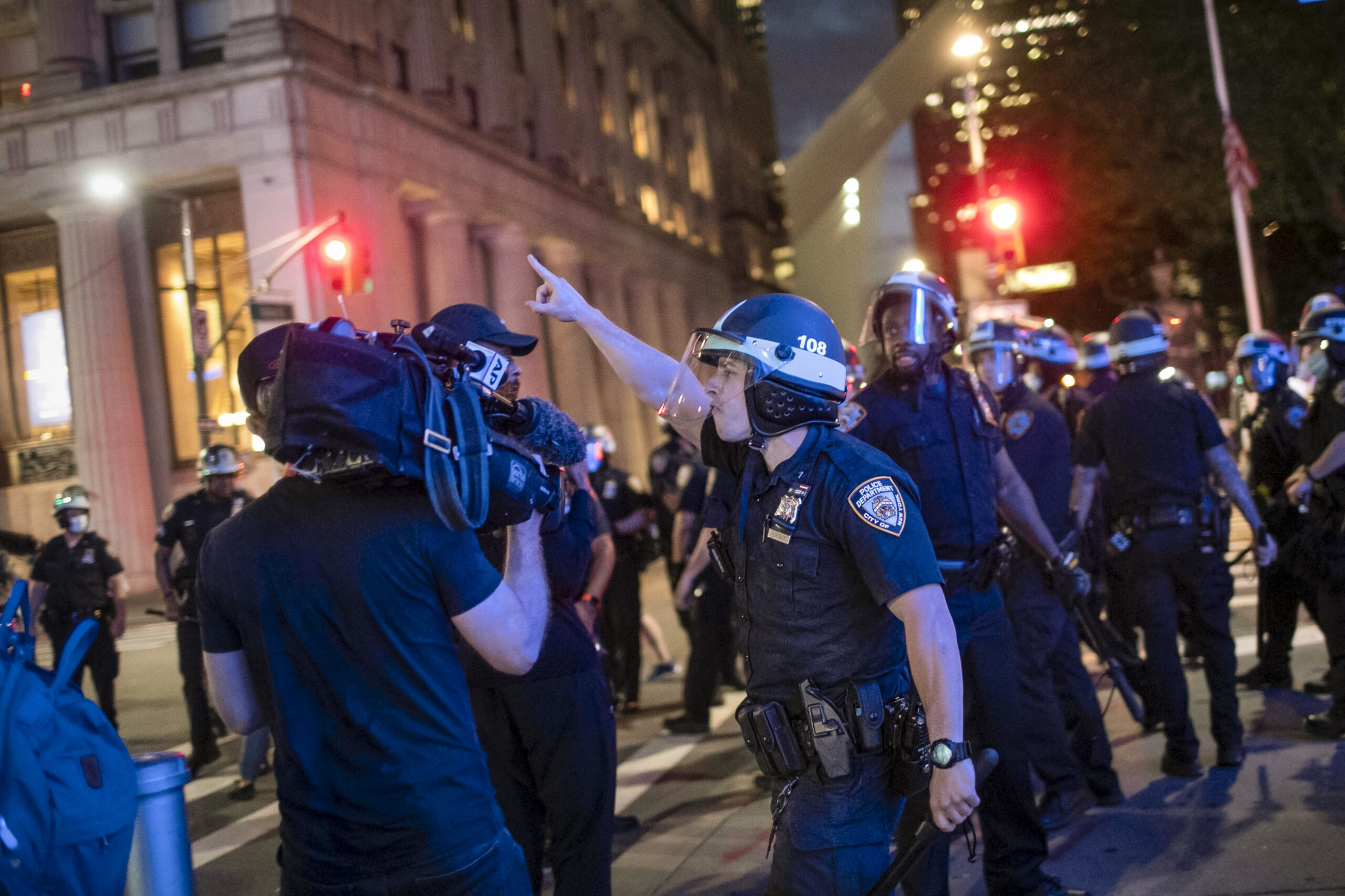In letter to New York officials, Reporters Committee denounces police attacks against journalists

The Reporters Committee for Freedom of the Press sent a letter on Saturday to New York City Mayor Bill de Blasio and Police Commissioner Dermot F. Shea, calling for law enforcement officers to stop attacking and arresting credentialed journalists covering protests that began after a white police officer killed George Floyd, a Black man, in Minneapolis on May 25.
The letter, co-signed by 126 media and press freedom organizations, emphasizes that police officers have no legal immunity when they clearly violate First Amendment freedoms. Though directed at New York officials, the legal rules outlined in the letter are applicable to jurisdictions around the country.
“The right of the press to document police activity is foundational to our democracy and has long been recognized and protected by the courts,” the Reporters Committee states in the letter, which follows a similar message sent to Minnesota officials on June 2. “The challenges that officers face in policing during times of civil protest do not supersede any of the rights guaranteed by the First Amendment, and moments of crisis demand that we protect the bedrock American ideal of a free press even more zealously.”
The letter describes a half-dozen incidents involving journalists covering protests in New York, including the arrests of Chris Mathias of The Huffington Post and freelance writer Keith Boykin, both of whom clearly identified themselves as members of the press. It also mentions an incident in which police repeatedly hit Wall Street Journal reporter Tyler Blint-Welsh in the face with riot shields, and pushed him to the ground, despite the fact that he was wearing an NYPD-issued press badge.
As of June 6, according to data from the U.S. Press Freedom Tracker, more than 300 incidents of press freedom violations have been reported nationwide since the start of the demonstrations, during which protesters are demanding racial justice, an end to violence against Black Americans and greater police accountability. Police have arrested, detained, and threatened journalists, and have physically assaulted them with rubber bullets, pepper balls and spray, tear gas, batons, and fists.
The Press Freedom Tracker is continuing to process and verify each of these reported cases, and has gradually updated its tally of violations over the past week and a half.
The Reporters Committee’s letter notes that de Blasio and New York Gov. Andrew Cuomo have both recently addressed the importance of having journalists document the demonstrations. “A free press is the lifeblood of democracy,” Cuomo said. “Now more than ever, it is critical that reporters & photographers can safely document protests without fear of harm or targeting.”
But the letter also clarifies that as a matter of settled law, “When an officer knows a journalist is a journalist, just one arrest or assault is a profound and clear violation of the First Amendment.”
The Reporters Committee’s letter urges the mayor and police commissioner to immediately implement measures to protect reporters and ensure the public is informed. Chief among them: that higher-level officials instruct officers that they cannot interfere with identifiable journalists covering protests, and that the officers themselves would receive no legal immunity for doing so. The letter also calls for swift discipline for officers who do arrest or assault journalists.
Finally, the letter raises a separate but related issue about curfew enforcement. As jurisdictions around the country have imposed curfews in response to the protests, most have exempted the news media, effectively as an “essential service.” All jurisdictions should do so. The Reporters Committee is, however, investigating reports that journalists have been arrested for curfew violations, even in cities with a media exemption.
The legal analysis in such a case would be the same: The media has the right under the First Amendment to document police activity, and violators of that right can be sued.
But the implications of curfew-related arrests of journalists are, as a matter of policy, even more profound. That is — a curfew is one of the most intrusive constraints on individual liberty, and how a curfew is enforced is intensely newsworthy and in the public interest. It is imperative that the media be allowed to report on how these curfews are being enforced, which both serves to document any misuse of police power and acts as a deterrent on abuse.
On Sunday, a spokesperson for Mayor de Blasio responded to the Reporters Committee’s letter. “For your awareness, officers have been informed that journalists are exempt from the curfew and within their legal rights to be at protests documenting what they see,” the spokesperson said. “Further, journalists should not be subject to any arrests.”
Read the full Reporters Committee letter.
The Reporters Committee regularly files friend-of-the-court briefs and its attorneys represent journalists and news organizations pro bono in court cases that involve First Amendment freedoms, the newsgathering rights of journalists and access to public information. Stay up-to-date on our work by signing up for our monthly newsletter and following us on Twitter or Instagram.
AP Photo by Wong Maye-E